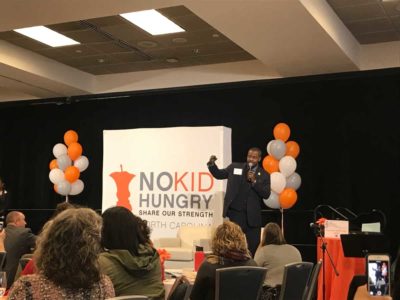|
|
No Child Hungry and Save Our Children virtually hosted the 2023 Rural Child Hunger Summit this week. This annual event focused on partnerships, with presenters spanning the nation providing regional solutions to curb childhood hunger in rural areas.
Anne Filipic, CEO of Share Our Strength, welcomed the crowd by thanking the audience for their continued commitment to rural children and their families.
We know that rural America is full of people who look out for each other and who are deeply dedicated to the well-being of their communities.
Anne Filipic, CEO of Share Our Strength
She says nine out of 10 counties with the highest food insecurity rates in the United States are rural. And according to the Center for Public Education, “approximately 4.3 million rural students (44%) attend high-poverty schools, that is, a school in which more than half of the students are eligible for free or reduced-price lunch.”
She believes partnerships are at the heart of ending rural child hunger. The summit continued by introducing partnerships that were centered around policy solutions and best practices to feed our rural areas. The sessions were recorded and can be found below.
Rural Child Hunger Summit recordings
Sowing Seeds for Wellness: How Childhood Food Insecurity Shapes Physical, Mental, & Emotional Health
Delve into the intricate relationship between early-life food and nutrition security and lifelong well-being. This session, led by experts in nutrition, child development, and public health, provides participants with an understanding of how inadequate access to nourishment can reverberate across physical, mental, and emotional dimensions.
Serving Up Solutions: Innovative Approaches to Delivering Non-Congregate Summer Meals in Rural Areas
This session is an exploration of strategies aimed at expanding the reach of summer meal programs via non-congregate meal service in rural communities. Bringing together expert voices from diverse sectors, including food banks, school systems, and libraries, this session provides a multifaceted perspective on effective strategies to extend meal access to underserved children during the summer months.
Nourishing Diversity: Perspectives on Black, Indigenous, & Hispanic Community Food Initiatives
In this session, participants gain a better understanding of the unique strengths, cultural perspectives, and systemic challenges that shape food security efforts in Black, Indigenous, and Hispanic populations. By examining success stories and confronting obstacles head-on, participants emerge with a deeper appreciation for the importance of culturally sensitive approaches to food security.
Building Resilience through Disaster Relief and Recovery
When unpredictable climate events hit, rural areas experience impacts to their infrastructure and community to different degrees of catastrophe than in urban areas. Learn from various perspectives, from research literature, to a large scale relief organization, and a community partner, on how localized disaster response and recovery solutions can be designed effectively.
Data Insights that Center Rural Community Voices
From interventions at a local level to federal policies, community voices must be included to inform the design and implementation of decisions. Learn how insights from data collection and program evaluation are crucial to draw out communities’ unique assets and challenges.
Cultivating Education and Rural Communities: Exploring the Intersection of HBCUs and Food Insecurity
This session will highlight the often-overlooked problem of food insecurity within historically Black colleges and universities (HBCU) and the communities they serve. While HBCUs have historically been pillars of education and social progress, they also bear the responsibility of ensuring the well-being of their students and contributing to local community development. Food insecurity is a pressing issue affecting both students and the surrounding communities.
Youth Voices in Advocacy
This generation of youth are bold and passionate about creating real change for children and families. They are sharing their personal stories to uplift the voices of those who have experienced food insecurity. They are also dialed into what the Farm Bill and SNAP means to rural communities.
From Cafeteria to Conversation: Integrating Student Perspectives into School Meal Programs
Explore the impact of involving students in shaping their own school meal experience. No Kid Hungry staff highlight innovative strategies for bridging the gap between meal offerings and student preferences. Participants delve into effective techniques for gathering authentic feedback from students, understanding their culinary and cultural preferences, and creating a dialogue that empowers students to influence menu choices.
The Value Chains Linking Together Rural Food Access
Organizations that have developed diverse partnerships to increase their impact and reach specific demographics with food security programs. Presenters include an affordable housing authority and a health system engaging the community to design a mobile grocery store for residents in rural communities and an agricultural/environmental nonprofit who partners with local farmers and healthcare providers to implement a rural produce prescription program.
Cultivating Education and Rural Communities: Exploring the Intersection of HBCUs and Food Insecurity
This session will highlight the often-overlooked problem of food insecurity within HBCUs and the communities they serve. While HBCUs have historically been pillars of education and social progress, they also bear the responsibility of ensuring the well-being of their students and contributing to local community development.
Nourishing Diversity: Perspectives on Black, Indigenous, & Hispanic Community Food Initiatives
In this session, participants gain a better understanding of the unique strengths, cultural perspectives, and systemic challenges that shape food security efforts in Black, Indigenous, and Hispanic populations. Attendees engage in thought-provoking discussions, guided by experts and community leaders, delving into the intersection of culture, equity, and access.
Resources
SAMHSA’s Social Determinants of Behavioral Health and Wellbeing




